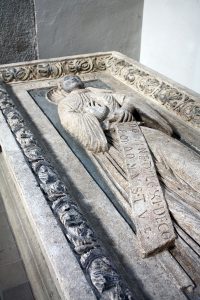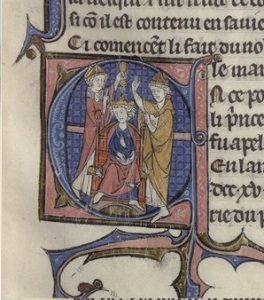The Succession
Barrie Brill
Pippin was the first of his family to have united the office of mayor of the palace of Austrasia and Neustria under his authority. When Pippin died in 714, the two sons he had had with Plectrude had already died. Drogo, the eldest son of Pippin and Plectrude, had died in 708 while their younger son Grimoald, already mayor of the palace of Neustria, had died a few months before his father. As soon as this happened, Pippin, who was already very ill, and his wife Plectrude had proclaimed as mayor of the palace the young son of Grimoald, Theudoald, who was only six years old. When Pippin died on December 16, 714, the whole of the territories that he had subjected to Frankish authority was theoretically in the hands of a child, in whose name Plectrude ensured the regency. For all those who had accepted the tutelage of the Pippinids reluctantly, this was an opportune moment.
Pippin’s death opened a major crisis which threatened not only the continuance of his own family, but also the unity of the Merovingian kingdoms. This succession crisis can also be explained by the fact there was no body in the Kingdom of the Franks that was capable of arbitrating conflicts of this type. The Merovingian monarch was a pawn in the hands of the mayors of the palace. The episcopate was also much involved in this conflict. The only solution was armed conflict that would bring victory to whoever could group behind him the largest number of supporters and faithful followers in the same way as Pippin II had acquired supremacy over the Frankish kingdom in 687.
However, there was another son, Charles, of a second wife by the name of Chalpaida. The Liber historiae Francorum mentions the birth of this son in the chapter that follows the account of the decisive victory at Tertry over Bercharius, mayor of the palace of Neustria, in 687, by his father Pippin. This victory meant that Pippin was in control of the office of mayor of the palace of Neustria. The marriage of Pippin with Chalpaida that led to the birth of Charles should be understood in the context of the preparations for this crucial confrontation with Neustria. She brought to Pippin the decisive support of a powerful network around Liège and Maastricht. After the account of the battle, the Liber enumerates the Merovingian kings whose deaths quickly succeeded one another without mentioning the child or his mother, who disappeared from the entourage of Pippin to the profit of his other spouse Plectrude. Charles only reappears in the Liber in 716 in the guise of a prisoner: “Charles, in these days, was held under guard by the lady Plectrude. With God’s help, he escaped with difficulty.”[1]
As the son of a second wife, Charles does not bear a characteristic name of the Pippinid family, but make no mistake, he was clearly not a “bastard”, a term that had little meaning in the eighth century. He was born into a world where it was understood that all the sons of a free man could take part in his inheritance, no matter which mother gave birth to them. Many of the magnates lived in a system of polygamy that distinguished between wives only by reference to the power of the family from which they came.
The Role of Plectrude
The behavior of Plectrude in these decisive years provides an important lesson in Merovingian politics. Plectrude did not intend to bequeath the inheritance of Pippin—a good part of which came from her own family—to a child of another bed. She claimed the regency over the two mayors of the palace in the name of one of her grandchildren, Theudoald, a child of six years of age. She placed Charles in custody, as she settled at Cologne where she held the loyalty of the magnates. She ruled in a climate of civil war.
The Neustrian nobility who had only reluctantly accepted the rule of Pippin now rose against the Austrasians and began to organize themselves. In September 715 they inflicted a stinging defeat on the armies of Theudoald at Compiègne. This was the first time since 687 that the Neustrians had put a Pippinid army to flight. They were strengthened when King Dagobert III named as mayor of the palace one of the artisans of the victory, named Ragamfred. He was descended from a powerful family traditionally hostile to the Pippinids, like so many other aristocratic families throughout the Frankish kingdom. When Dagobert III died in the winter of 715-716, Ragamfred had a son of Childeric I, the only adult Merovingian available, taken from the monastery where he lived with the clerical name of Daniel; he was now named Chilperic II, symbolizing the revival of the Kingdom of Neustria.

The situation became critical for the Austrasians and Plectrude when Ragamfred concluded an alliance with the Frisian king Radbod. The Neustrians pillaged the Ardennes and the valley of the Meuse disrupting the heart of Pippinid power, while the Frisians organized a naval raid on the Rhine valley as far as Cologne. In the spring of 716, Plectrude was forced to turn over to Ragamfred and the Neustrians a portion of the treasure (this was the key to power in the short term) of Pippin, thus acknowledging the autonomy of Neustria.
Charles, who managed to escape the prison where Plectrude had locked him up, then appeared to the Austrasians as the only individual able to save the situation. He found enough initial support amongst his father’s loyal followers to move first against the Frisians and then turn against the Neustrians who he defeated at Amblève (716) in the Ardennes. These initial successes drew even more numerous and powerful men to rally to his cause. With an even larger army he definitively defeated Ragamfred and Chilperic II at Vinchy in March 717. This victory allowed him to force Plectrude to recognize him as the successor of Pippin, and she turned over to him what remained of the “treasury” of Pippin—the crown lands that represented the wealth, prestige, and power of the individual who held them. Plectrude was forced to leave the political scene and retired to her foundation of Saint Mary of Cologne where she died and was buried a short time later. The rapid growth of Charles’ camp provides support to those who see Merovingian history as a question of periodic compromises, rather than as a competition between large immutable family groups. What became abundantly clear after the victory of Vinchy, and even more so after his victory at Soissons (718), was that Charles had gathered to his side not only his relatives but also those whom he convinced, through the wealth that he had seized from Plectrude, that he was the only individual who could restore order.
The Last of the Merovingians
To demonstrate his equality with the mayor the Neustrian palace Ragamfred, Charles placed on the throne of Austrasia a Merovingian named Chlothar IV. This demonstrates the importance of the feeling of legitimacy that still surrounded the Merovingian dynasty. While it was certainly the mayors of the palace and their supporters who chose the king, it was still difficult to imagine a kingdom without a Merovingian sovereign who still possessed a charismatic power transmitted by blood. Only the family of the descendants of Clovis, in fact, possessed sovereign authority and the mayors of the palace, recruited from the Frankish aristocracy, only exercised executive power on their behalf. However, the moment was favourable since the only Merovingian then ruling, Chilperic II, had been defeated at Vinchy and had taken flight along with Ragamfred. This was enough to undermine his personal prestige and even the belief that he was supported by God. To see Chlothar as a “puppet” is to ignore the change that had taken place. While Chlothar was probably not a weighty head of the government, nonetheless, he was its soul and its justification. His name appeared on charters. Whoever had a king at his side had the right to raise the army and thus the power to conquer. This was a lesson known not only to Charles, but also to his opponents.

In the meantime, Ragamfred had allied himself with Eudo, the Duke of Aquitaine, another figure in the anti-Pippinid struggle. Thus, it was only in 719 that Charles could resume the offensive against the Neustrians and their allies. When Ragamfred was again defeated in 719 he fled to Anjou, while Eudo withdrew to Aquitaine taking with him King Chilperic II and his treasure. Chlothar had died in the meantime, so Charles negotiated with Eudo in 720. At the end of these negotiations, Charles recognized Eudo as “dux” or duke of Aquitaine, while Eudo turned over Chilperic II and the treasure to Charles Martel. Charles seized Chilperic not to eliminate him but to have him recognized as the sole king of the Frankish kingdom. In return, Chilperic II, the only Merovingian king and the last to attempt to oppose the Pippinids, acknowledged Charles Martel as mayor of the palace of the two kingdoms of Neustria and Austrasia that were reunified. Ragamfred maintained his authority over a small principality that he had carved out around Angers that he held until his death in 731. The authority of Charles was uncontested north of the Loire, where he was recognized as princeps or prince, but he was far from subjugating the regions south of the Loire.
Questions for Consideration
- What roles did marriage play in the Kingdom of the Franks?
- What does the fate of Plectrude tell us about the role of women in the Frankish elites?
Media Attributions
- Sarcophagus of Plectrude, in Saint Maria, Cologne © HOWI is licensed under a CC BY (Attribution) license
- Coronation of Charles Martel (cropped) © Primate of Saint-Denis is licensed under a Public Domain license
- Liber Historiae Francorum, chapter 51, MGH, Scriptores rerum Merovingicarum, ed. B. Krusch (Hanover, 1888), 325 ↵
the title of bishop

